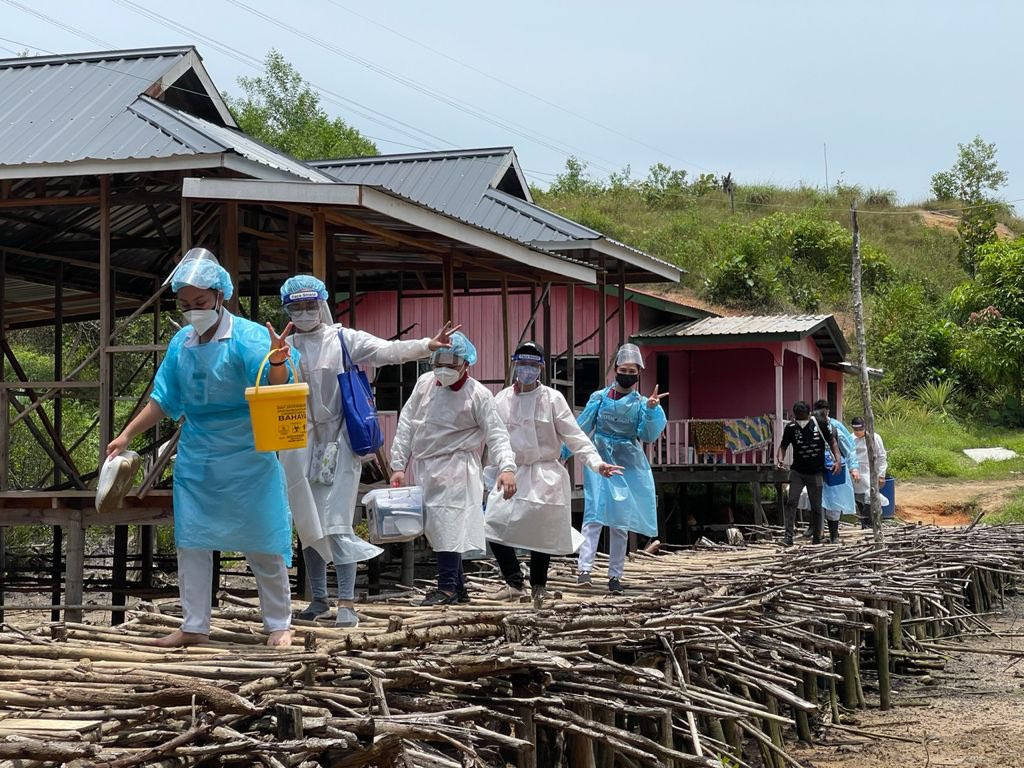KUALA LUMPUR, Sept 17 — Public health experts urged the government to plan for long-term vaccination while boosting health care capacity for a sustainable phase of living with Covid-19 indefinitely.
Prof Dr Lokman Hakim Sulaiman, an epidemiologist and a professor of public health at International Medical University, said that the Ministry of Health (MOH) should first define the “acceptable” level of Covid-19 transmission, particularly the incidence rate, hospitalisation and mortality rate, by inculcating a certain level of vaccination coverage for a particular geographical area, like districts or states.
MOH should also ensure an adequate number of beds in hospital intensive care units (ICU) all the time, said Dr Lokman, as Malaysia plans to transition by the end of October into the next phase of treating Covid-19 as an endemic disease that is expected to remain in the country for the foreseeable future.
“The number for ICU beds should be at least double of the number prior to Covid-19 pandemic. Some of the repurposed ICU beds should have been converted as permanent ICU beds by now,” Dr Lokman told CodeBlue recently.
“The number of ICU beds is grossly inadequate even during pre-Covid and we were struggling even during the dengue outbreak previously.”
Prof Dr Lokman Hakim Sulaiman, pro vice chancellor of research and professor of public health at International Medical University
Dr Lokman, who is also a former Health deputy director-general of public health, stressed that pandemic management in the country should focus on mitigation measures to steer a stable public health care system because highly infectious coronavirus variants can still cause vaccine breakthrough infections in the country.
“Without effective treatment to treat the infected person who is the source of infection to others, vaccines will not be able to eliminate the infection.”
In line with mitigation measures, Dr Lokman also said that Covid-19 rapid antigen tests (RTK-Ag) should be used as the “first line” confirmatory test and be made widely accessible to the community, including people in rural areas.
“The community nurses can be trained to do the test. Testing service should be complemented by mobile clinics in remote villages.”
Although mass screening is no longer necessary under the mitigation phase, he said that infected people must exercise isolation measures to reduce the spread of the coronavirus.
“However, if the infection appears in a defined geographical area where the vaccination coverage is low even among the most vulnerable like Orang Asli villages, mass screenings may still be considered.”
As Covid-19 has already widely affected states outside the Klang Valley, Dr Lokman advised state health departments to embrace mitigation strategies immediately and not to wait until hospitals experience a “collapse” phenomenon with a surge of deaths.
“MOH must empower their state directors to do what is necessary now before it is too late. Do not let the scenario in Klang Valley be repeated in other states,” he said.
“In your state, if the sporadic cases are the majority and your hospitals are already under stress, you should no longer attempt to contain but rather to consolidate your strained resources to immediately mitigate the situation from getting worse.
“Instead to exhausting your limited resources to mass screening and trying to contain when you simply can’t, direct them to educate the public for early testing when symptomatic, enhance contact tracing of positive cases and ensure compliance to quarantine orders, improvise effective monitoring of early categories, and admit those who showed early signs of deterioration.”
Mainstream Covid-19 Vaccination Programme

Dr Christopher Lee, the national advisor for infectious diseases in MOH, called for the integration of the Covid-19 vaccination programme across existing health care facilities while phasing out vaccination sites (PPVs).
“At the moment, there appears to be a need for booster shots although data is yet to be completed on this. Therefore, the Covid-19 vaccination programme must be integrated into the country’s official health and hospital system so that the standalone and one-off centres need not be continued as they are not cost effective and sustainable in the long run,” Dr Lee told CodeBlue recently.
CodeBlue reported Wednesday that the Special Committee on Ensuring Access to Covid-19 Vaccine Supply (JKJAV) has approved administering third jabs — either Pfizer-BioNTech or AstraZeneca-Oxford — to double-vaccinated adults, prioritising high-risk groups in states that have fully vaccinated more than 80 per cent of their adult populations like individuals with weak immune systems, adults aged 60 years or older with comorbidities, and frontline health care workers, among others.
Dr Lee said that integration of the Covid-19 vaccination programme into the country’s mainstream health system will be a bridge to assess vaccination rates easily and regularly.
Neighbouring countries like Thailand have already administered a third Covid-19 shot to health care frontline workers, while intending to begin that initiative for the public by the end of September.
Singapore will also launch a Covid-19 booster programme for elderly people aged above 60 and individuals who are moderately to severely immunocompromised, starting from this month.
Enhance Public Health Capacity, Improve Infectious Disease Notification System

Furthermore, Dr Lokman called on MOH to come up with a comprehensive Covid-19 control programme by enhancing public health functions and strengthening them with additional manpower and resources to conduct early case verification, case investigation, contact tracing, and to enforce compliance to quarantine.
“If the public health function collapses, the entire health system will collapse.”
He added that the notification system for infectious disease must be upgraded to improve efficiency of case investigation and application of intervention measures.
“The current eNotis system is outdated and cannot cope with a high number of cases. I strongly believe that the crux of the matter in the overall failure of our public health response to Covid-19 pandemic is because of the failure of the notification system,” he said.
“This issue of backlog in case verification and registration resulted in the delay in public health responses. This backlog issue has been admitted by MOH before, but unfortunately nothing has been done to improve the situation.”
Prof Dr Lokman Hakim Sulaiman, pro vice chancellor of research and professor of public health at International Medical University
Besides that, Dr Lokman pointed out the need to increase investment in public health functions and continuous expedition of vaccination drives in the country.
According to consultant paediatrician Dr Amar-Singh HSS, indoor and work-place safety features should be improved drastically to ensure proper ventilation.
“At all times we must realise we are in this together. If we do not help the poor and migrants, we do so at our collective peril. How Covid-19 evolves depends on our collective behaviour and supporting each other is critical, assuming we do not see new variants appearing that are partially or fully resistant to vaccine-induced immunity.”








